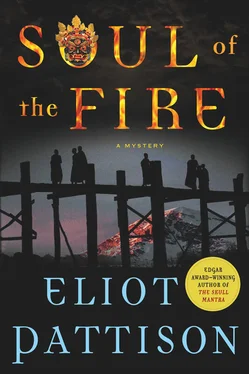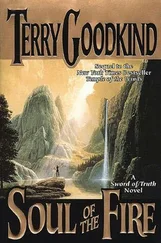Eliot Pattison - Soul of the Fire
Здесь есть возможность читать онлайн «Eliot Pattison - Soul of the Fire» весь текст электронной книги совершенно бесплатно (целиком полную версию без сокращений). В некоторых случаях можно слушать аудио, скачать через торрент в формате fb2 и присутствует краткое содержание. Год выпуска: 0101, ISBN: 0101, Издательство: St. Martin, Жанр: Полицейский детектив, на английском языке. Описание произведения, (предисловие) а так же отзывы посетителей доступны на портале библиотеки ЛибКат.
- Название:Soul of the Fire
- Автор:
- Издательство:St. Martin
- Жанр:
- Год:0101
- ISBN:9781250036476
- Рейтинг книги:4 / 5. Голосов: 1
-
Избранное:Добавить в избранное
- Отзывы:
-
Ваша оценка:
- 80
- 1
- 2
- 3
- 4
- 5
Soul of the Fire: краткое содержание, описание и аннотация
Предлагаем к чтению аннотацию, описание, краткое содержание или предисловие (зависит от того, что написал сам автор книги «Soul of the Fire»). Если вы не нашли необходимую информацию о книге — напишите в комментариях, мы постараемся отыскать её.
Soul of the Fire — читать онлайн бесплатно полную книгу (весь текст) целиком
Ниже представлен текст книги, разбитый по страницам. Система сохранения места последней прочитанной страницы, позволяет с удобством читать онлайн бесплатно книгу «Soul of the Fire», без необходимости каждый раз заново искать на чём Вы остановились. Поставьте закладку, и сможете в любой момент перейти на страницу, на которой закончили чтение.
Интервал:
Закладка:
Shan shot up and darted to the open window. The scream sounded again from somewhere on the far side of a large truck that had stopped on the road outside the town wall, blocking their view. Then came shouts from onlookers running past the truck. Pedestrians on the road stopped to turn toward the prison. Major Sung spat a curse and tried to close the drapes over the window, but Judson stepped close, pressing his hand against the glass to stop him. A siren began to whine and constables ran out of the post by the gate. Government workers streamed out of the buildings, pointing up the slope.
Then the truck pulled away and Shan had his answers. A monk in a maroon robe sat on one of the burial mounds, an arm stretched beseechingly toward the sky. He was engulfed in flames.
CHAPTER TWO
Shan was so fatigued, he did not realize he had a visitor until the man kicked his slop bucket. He groggily sat up on the cold metal slab hanging on chains that served as his bed. The dark figure loomed over him, silhouetted by the corridor light, then suddenly the naked bulb overhead switched on.
“We haven’t become sufficiently acquainted, Comrade Shan,” Tuan said. “Things moved too quickly yesterday. Your truck was late. Major Sung insisted we had to meet to make up the disrupted schedule. If you understood our expectations more fully this-” He searched for a word. “-this embarassment could have been avoided. A bad start. We will make a new one today.”
Shan swung his legs over the side of the cot and shook the fog from his head. Before drifting off to sleep he had lain awake for hours, replaying the prior day’s events in his mind, haunted by the image of the burning monk. Even when he finally shut his eyes, the strange verses had echoed in his head. “I couldn’t understand why the Commission was reviewing those files. I thought it must just be another campaign to explain crime in political terms. But it’s about the suicides,” he said. It took me this long to learn / How frightened they are of flames, one of the verses had said. “It’s about the self-immolations.” Shan wasn’t shamed or frightened. He was angry. “Tibetans are dying, and you want to make a political charade of it.”
Tuan seemed confused. “The Deputy Secretary gave a speech at the Commission’s opening banquet. We need to ensure that our policies are rooted in international consensus.”
Shan followed Tuan’s gaze to the little shelf by the holding cell’s door that held a bottle of water and a paper cup turned upside down. He was wondering if Shan had taken the capsules they left in the cup. “Deputy Secretary?” Shan asked. He had broken the capsules apart and buried them in the bucket.
“Pao Xilang. The General Secretary is old and sickly, a figurehead. Pao runs the Party in Tibet. Which means he runs Tibet. Surely you know about Pao.”
“Emperor Pao,” Shan said. His voice was hollow. The young star of the Party was known not just for his imperious manner but also for the merciless way he dealt with Tibetans. “And what about the immolation we witnessed yesterday? Has the Deputy Secretary decided? An industrial accident? More drugs? A faulty cigarette lighter might work, except monks don’t smoke. Anything but a protest.”
Shan was ready for a slap, a punch to the belly, a threat of torture. Instead Tuan shrugged and gestured toward the door. “Put on your shoes,” he suggested, then grimaced when he noticed Shan’s tattered work boots. “You came in those?”
“Ditch inspectors work in mud. I was on my official duties when I was summoned.”
“The motherland makes unexpected demands of us,” Tuan said in a strangely apologetic tone. He waited for Shan to tie his boots, then knelt with the air of a servant and straightened his pants legs so they hid the boots before leading him out of the cell. The corridor had no windows, and as they walked along the dimly lit passage Shan realized he had no idea of the hour. The building seemed empty. The freshly mopped floor stank of cleanser. A Tibetan janitor with a jaw of grey stubble paused in his work to stare out at them from a darkened doorway.
“It snowed last night,” Tuan said conversationally. “Just flurries. People think Tibet should have lots of snow, but it’s too dry. Only at higher elevations.”
Shan eyed Tuan suspiciously. He seemed too easy to please Shan. There were operatives all over China trained to do nothing but probe and test those deemed politically unreliable. “I worked on prison crews that cleared the high roads in the winter. There could be twenty feet in some passes, with drifts along cliffs so wide you couldn’t tell where the mountain ended. The guards would send old Tibetans out to test them. Half of them didn’t come back. The snow would give way and they would just disappear. No one even bothered to look for their bodies.”
His tale silenced Tuan, who just stared at the floor until they reached a set of double doors near the end of the corridor. Shan hesitated, looking back to see the old janitor in the hall now, leaning on his mop, still staring at them.
They entered a cavernous chamber with dining tables at one end and sofas arranged in squares at the other. Through swinging doors beyond the tables came the clatter of a busy kitchen. The far wall was lined with windows. Fingers of grey and purple reached across the night sky, with a blush of pink on the horizon. Shan resisted the urge to dart to the windows to gaze on the darker shadow on the hillside that was Longtou Prison. Lokesh was there, beaten and in pain, lying in a cold stonewalled cell.
Instead, Shan studied the hall with the eye of a prisoner as he followed Tuan. The windows slid sideways on metal tracks. In seconds, he could open one and drop to the ground one story below. The hallway behind them was dark. He could spin about, race out the door, and lose Tuan in the labyrinth of corridors. Cooks and food workers began milling through the kitchen doors. The workers and their carts would provide cover if he darted through the kitchens.
He glanced back at Tuan, who was pulling out a chair for him as a woman in an apron arrived with a tray holding two bowls of porridge, two cups, and a pot of tea. “The Commission is a wonderful opportunity for a man like you,” Tuan declared as he poured the tea.
Shan silently sipped at his steaming cup, confused by the nervousness in the young officer’s voice. “I want to know exactly where my friend is. I want to see him.”
Tuan’s brow furrowed. “I have no idea what you are speaking of.”
“He’s in the prison. Longtou.”
“You misunderstand certain things.”
“I misunderstand everything,” Shan shot back. “Have him released.”
“I told you, I am not Public Security. I am just BRA.”
Shan lowered his cup. “Tibetans hate the Bureau of Religious Affairs more than they hate Public Security. Public Security just wants to take away their freedom. You want to take away their gods.”
Tuan gave an exaggerated grimace. “I’ve heard it all before. We mock the traditional deities. We disrupt the old ways that define the common people. What we want is to pull them out of the muck of disease and poverty they’ve lived in for centuries. Orphans who need to embrace their motherland,” he added, repeating a slogan from a new Religious Affairs poster campaign.
Shan studied Tuan more carefully, noticing now his long features and aquiline nose. “One of your parents was Tibetan,” he ventured.
Tuan offered a reluctant nod. “My mother. Sure, I’m a goat,” he quipped, using one of the less pejorative labels applied by Chinese to those of mixed Tibetan and Chinese blood.
“How does your job make her feel?”
Tuan seemed to find the question humorous. “She tried to make me Tibetan when I was young. Forced me to eat roasted barley and buttered tea and sit before images of long-dead men,” he replied with a grin. “But she died a long time ago.”
Читать дальшеИнтервал:
Закладка:
Похожие книги на «Soul of the Fire»
Представляем Вашему вниманию похожие книги на «Soul of the Fire» списком для выбора. Мы отобрали схожую по названию и смыслу литературу в надежде предоставить читателям больше вариантов отыскать новые, интересные, ещё непрочитанные произведения.
Обсуждение, отзывы о книге «Soul of the Fire» и просто собственные мнения читателей. Оставьте ваши комментарии, напишите, что Вы думаете о произведении, его смысле или главных героях. Укажите что конкретно понравилось, а что нет, и почему Вы так считаете.












